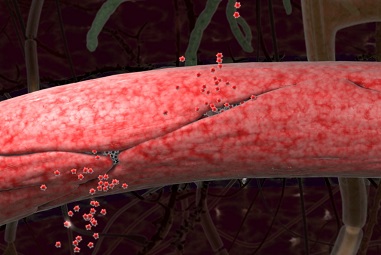Study Shows That SARS-CoV-2 Spike Protein Induces Endothelial Cell Permeability AND von Willebrand Factor Secretion
COVID-19 News - SARS-CoV-2 Spike Protein Induces Endothelial Cell Permeability Apr 02, 2023 2 years, 10 months, 3 weeks, 18 hours, 29 minutes ago
COVID-19 News: A news study by researchers from the Institute of Life Science, School of Medicine, Swansea University - UK has found that the SARS-CoV-2 spike protein induces endothelial cell permeability and von Willebrand Factor secretion.

COVID-19, caused by the SARS-CoV-2 virus, has become a global pandemic with devastating effects on public health and economies worldwide. While primarily a respiratory disease, COVID-19 has increasingly been recognized as a vascular disease, affecting endothelial cell (EC) permeability and von Willebrand factor (vWF) secretion as covered by numerous past studies and
COVID-19 News coverages.
The study delved into the mechanisms by which the SARS-CoV-2 spike protein induces endothelial cell permeability and vWF secretion, and discussed potential therapeutic targets for COVID-19.
The Role of SARS-CoV-2 Spike Protein in Endothelial Dysfunction
SARS-CoV-2 infection primarily targets the respiratory system, but it is also known to affect the vascular system. Endothelial cells, which form the inner lining of blood vessels, play a critical role in maintaining vascular homeostasis. In COVID-19 patients, the virus has been shown to disrupt endothelial barrier function, leading to increased permeability and the release of vWF, a key factor in blood clotting and inflammation.
Increased vWF secretion has been associated with COVID-19-associated coagulopathy (CAC), a condition characterized by a high risk of blood clots and microvascular thrombosis, which can lead to organ failure and increased mortality.
Furthermore, the SARS-CoV-2 spike protein has been shown to disrupt the endothelial barrier by altering the expression of ACE2, a cellular receptor that the virus uses to enter host cells.
Investigating the Mechanisms Underlying SARS-CoV-2-Induced Endothelial Dysfunction
To better understand how the SARS-CoV-2 spike protein induces endothelial dysfunction, the study team conducted in vitro experiments using endothelial cell lines. The study findings showed that the spike protein's receptor-binding domain (RBD) can increase endothelial cell permeability and vWF secretion in a dose- and time-dependent manner.
The experiments also revealed that the SARS-CoV-2 spike protein can increase the expression of ACE2 and activate ADP-ribosylation factor (ARF)6, a small GTPase involved in regulating cellular processes such as endocytosis and membrane trafficking. This suggests that ARF6 may play a role in the spike protein-induced endothelial dysfunction.
Moreover, the activation of Rho-associated kinases 1 and 2 (ROCK1/2), which control key aspects of the actin cytoskeleton, was also found to be involved in SARS-CoV-2-induced endothelial dysfunction. The spike protein was shown to activate the NF-κB signaling pathway and promote the production of reactive oxygen species (ROS), which can lead to oxidative stress and mitochondrial dysfunction.
Potential Therapeutic Targets for COVID-19
Given the involvement of various signaling molecules in SARS-CoV-2-induced endothelial
dysfunction, several potential therapeutic targets have been identified.
Inhibitors targeting ACE2, ARF6, NF-κB, and ROCK1/2 have all shown promise in reducing endothelial cell permeability and vWF secretion in in vitro studies.
For instance, chlortetracycline, an ARF6 activation inhibitor, has been found to effectively reduce endothelial cell permeability and vWF secretion induced by the SARS-CoV-2 spike protein. Similarly, SC514, an NF-κB inhibitor, and Y27632, a ROCK1/2 inhibitor, have both shown significant inhibitory effects on SARS-CoV-2-induced endothelial dysfunction.
In addition, N-acetylcysteine (NAC), an antioxidant and a precursor to the endogenous antioxidant glutathione, has been shown to possess anti-inflammatory and vasoprotective properties. By scavenging reactive oxygen species (ROS) and reducing oxidative stress, NAC may counteract the detrimental effects of the SARS-CoV-2 spike protein on endothelial cells.
The study showed that SARS-CoV-2 spike protein-induced EC permeability and vWF secretion can be inhibited by various inhibitors, such as dalbavancin, ACE2 inhibitory antibody, chlortetracycline, SC514, Y27632, and NAC. It is however important to note that although these inhibitors have been used in vitro in this study, their in vivo efficacy and safety have not been assessed in the context of COVID-19. Further research is necessary to evaluate the potential of these inhibitors as therapeutic agents for COVID-19 patients, focusing on their ability to reduce the leaky vasculature and thrombotic events associated with the disease. Future investigations should also address the potential side effects and toxicity of these inhibitors in vivo.
Other Findings
The study also found that the reorganization of the endothelial cells due to the cytokines produced as a result of SARS-CoV-2 infections and also the virus proteins, leads to the opening of intercellular gaps, causing increased EC permeability and vWF secretion. The exact molecular mechanisms and the crosstalk between these signaling pathways need to be further investigated.
Conclusion
The study findings have provided new insights into the molecular mechanisms behind the SARS-CoV-2 spike protein-induced EC permeability and vWF secretion. The signaling cascade the study have identified, involving ACE2, ARF6, NF-κB, ROCK, and oxidative stress, may be a potential target for the development of novel therapeutic strategies to mitigate the vascular complications of COVID-19.
Further research is needed to confirm these findings in primary microvascular endothelial cells and to evaluate the therapeutic potential of the inhibitors identified in this study in vivo. As the understanding of the complex pathophysiology of COVID-19 continues to evolve, it is crucial to explore novel approaches to address the vascular dysfunction associated with the disease, in order to improve patient outcomes and reduce the global burden of this pandemic.
The study findings were published in the peer reviewed International Journal of Molecular Sciences.
https://www.mdpi.com/1422-0067/24/6/5664
For the latest
COVID-19 News, keep on logging to Thailand Medical News.
